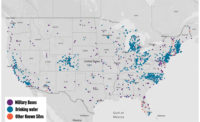As the 2020 presidential election draws nearer, many Democratic hopefuls are beginning to seek construction unions’ support. Eight declared candidates made their pitches to members of the North America’s Building Trades Unions at the group’s legislative conference April 9-10 in Washington, D.C. Several promised a major infrastructure package of $1 trillion or more, which aligns with the trades’ legislative agenda. But many seeking endorsement will wrestle with balancing calls for a green economy and unions’ demand for traditional oil and gas sector jobs.
In his opening remarks, building trades President Sean McGarvey declared that an infrastructure bill is the group’s top legislative priority this year. He called for “a pathway to rebuild our crumbling infrastructure that decades of budget cuts have devastated,” including bridges, roads, transit systems, pipelines, energy and water facilities and schools.
Several Democrats who spoke at the conference echoed McGarvey’s call, including House Speaker Nancy Pelosi (D-Calif.), who said the Democratic-controlled chamber would work to pass “at least a $1-trillion plan.”
Among presidential hopefuls, Sen. Amy Klobuchar (D-Minn.) said that a $1-trillion infrastructure package is a key item on her “Competitive Agenda for America” and suggested that reversing elements of the 2017 tax-cut law could help in funding the plan. Another contender, Sen. Cory Booker (D-N.J.), upped the ante, proposing a $2-trillion infrastructure plan that he said would be paid for by undoing some of the tax cuts.
Sen. Elizabeth Warren (D-Mass.) didn’t specify a dollar amount for an infrastructure bill, but said it could be paid for through a “2% wealth tax on the 75,000 biggest fortunes” in the U.S.
Democrats generally are in sync with the building trades on infrastructure, but there is some division on energy policy. Construction unions have grown increasingly close to the oil and gas industry in recent years, including a new partnership with the American Petroleum Institute.
Energy policy is an area where the 14 building trades often align with President Trump, particularly on pipeline construction. On April 10, Trump visited an International Union of Operating Engineers training center in Crosby, Texas, where he signed executive orders aimed at accelerating pipeline projects (see p. 8).
McGarvey warned lawmakers about abandoning infrastructure goals and focusing on green policies that could threaten oil-and-gas jobs. He said that after most candidates in 2016 elections touted infrastructure, “almost every member of this new Congress—and in both parties—got distracted by a shiny new object, the Green New Deal.” McGarvey added, “What we need is a real deal with real long-term committed investment and real action on infrastructure.”
In response, Pelosi suggested a “green ideal” that builds infrastructure “in a green way to preserve our planet” and adds to energy options, rather than subtracting from them. “I think we’re coming together on that,” Pelosi said directly to McGarvey from the podium.
Some speakers addressed needs of middle-class workers, a key demographic category in elections. For example, Klobuchar and former Colorado Gov. John Hickenlooper (D) called for raising the federal minimum wage to $15 per hour.
Some who addressed the conference also cited the need to follow the unions’ example and create skill-development and apprenticeship programs. Hickenlooper proposed incentives for companies to start training programs. “We will make up-skilling and re-skilling a standard benefit of employment, rather than an inadequate government retraining program after somebody loses a job,” he said.
McGarvey noted that pension reform remains a pressing concern for the building trades. He said some large pension plans “need relief now in this Congress.” If some plans fail, he warned, it will affect regional economies and the GDP.




Post a comment to this article
Report Abusive Comment